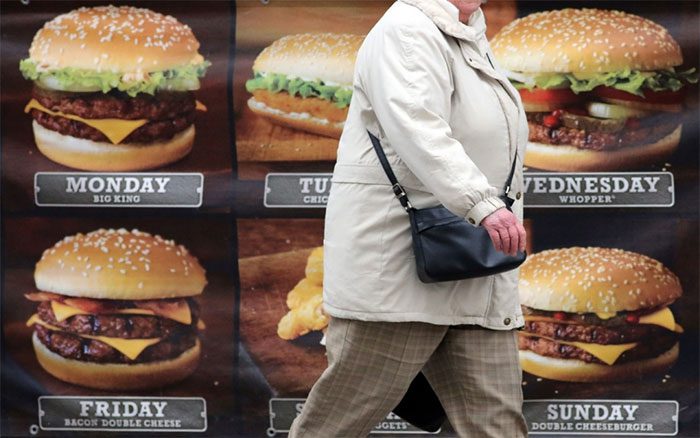Obesity can affect the brain, impairing the ability to recognize feelings of fullness and emotional satisfaction after consuming fats and sugars. This may explain why obese individuals find it difficult to lose weight and often easily regain it if they do manage to lose some.

Typically, after eating, the brain releases dopamine, giving the eater a feeling of satisfaction, along with signals to stop seeking food. However, in obese individuals, that brain function has been compromised. (Image: I.E)
An intriguing study by scientists at Yale University (USA) and the University of Amsterdam (Netherlands) reveals that obesity negatively impacts how a person’s brain responds to food and nutrients. According to the researchers, an obese person experiences long-lasting brain changes that limit their ability to feel positive emotions and satisfaction after eating.
Furthermore, these brain changes may persist even after obese individuals have lost a significant amount of weight. This mechanism may explain why many people are prone to regaining weight.
Dr. Caroline Apovian, a medical professor at Harvard Medical School, noted: “There is no sign of reversal – the brains of obese individuals continue to lack the chemical responses that tell the body: ‘Okay, you’ve eaten enough.’”
Medically defined, individuals are considered obese if they have a body mass index (BMI) over 30, while a normal weight is defined as a BMI between 18 and 25.
Dr. Apovian, who was not involved in the study, stated: “This research captures the reason why obesity is a disease; it causes actual changes in the brain.”
Dr. Sadaf Farooqi, a Professor of Metabolism and Medicine at the University of Cambridge in the UK, who also did not participate in the study, commented: “This study is very rigorous and quite comprehensive.”
The study was published on June 12 in the journal Nature Metabolism and involved a controlled clinical trial where 30 individuals considered medically obese and 30 individuals with normal weight were fed carbohydrates (glucose), fats (lipids), or water (as a control). Each group of nutrients was administered directly into the stomach via feeding tubes on separate days.

A woman passing a fast food advertisement in Bristol, UK. (Image: Getty Images).
How the Brain is Affected
Dr. Mireille Serlie, an endocrinologist at Yale School of Medicine and the lead researcher, stated: “We wanted to bypass the mouth and focus on the gut-brain connection to see how nutrients affect the brain independently when looking at, smelling, or tasting food.”
The night before the trial began, all 60 participants had the same dinner at home and did not eat again until the feeding tube was placed the following morning. As sugar or fat entered their stomachs through the tube, researchers used functional MRI (fMRI) and single-photon emission computed tomography (SPECT) to record brain responses over 30 minutes.
Dr. Farooqi mentioned: “MRI showed where neurons in the brain were using oxygen to respond to nutrients – that part of the brain lit up. Another scanning process measured dopamine – a hormone that is part of the ‘reward’ system, signaling when the brain finds something interesting or rewarding and then desires that thing.”
The researchers were interested in how fats and glucose would individually activate different areas of the brain connected to the ‘reward’ aspects of food. They wanted to know if this differed in obese individuals compared to those of normal weight.
Dr. Serlie explained: “We were particularly interested in the striatum – the part of the brain associated with the motivation to seek food and consume human food.” Located deep in the brain, the striatum also plays a role in emotion formation and habit development.
In individuals of normal weight, the study showed that brain signals in the striatum slowed down when sugar or fat was introduced into the digestive system – evidence that the brain recognized the body had been fed.
Dr. Serlie elucidated: “The overall decrease in brain activity is significant because once food is in your stomach, you don’t need to go searching for more food.”
Simultaneously, dopamine levels increased in individuals of normal weight, signaling that the brain’s ‘reward’ centers were also activated, meaning the brain communicated feelings of satisfaction after eating.
However, when similar nutrients were provided through tubes to those considered medically obese, brain activity did not slow down, and dopamine levels did not rise. This means the brain did not signal to stop seeking food and did not provide the feeling of satisfaction that comes with eating.
This was particularly true when the food was fatty. Dr. Farooqi noted this finding was intriguing because the higher the fat content, the more ‘rewarding’ the food becomes: “That’s why you really want to eat a hamburger instead of broccoli; the fat in the hamburger will elicit a better biological response in the brain.”
Next, the study required obese individuals to lose 10% of their body weight within three months – a weight loss known to help improve blood sugar levels, reset metabolism, and enhance overall health.
The tests were repeated as before – with surprising results. Dr. Serlie stated that weight loss did not reset brain mechanisms in obese individuals.
She said: “Nothing changed – the brain still does not recognize feelings of fullness or satisfaction. Now, you could argue three months is not long enough, or they didn’t lose enough weight.”
“But this finding could also explain why people successfully lose weight and then easily regain it, as the impact on the brain may not recover as we would hope,” the researcher explained.
A 2018 meta-analysis of long-term weight loss clinical trials showed that 50% of a person’s initial weight loss had “returned” after two years, and by the fifth year, 80% of the weight was back to where it started.
Further Research and Empathy Needed
Dr. Serlie stated there needs to be caution when interpreting these findings, as much is still unknown: “We do not know when these profound changes in the brain occur during the process of weight gain. When does the brain begin to lose its ability to feel?”

We err in thinking that weight gain can be simply solved by “just eating less, exercising more, and if you don’t do that, it’s a lack of willpower.”
Obesity has genetic factors and although the research attempted to control for this by excluding those who were obese in childhood, there remains the possibility that “genes are affecting our brain’s response to certain nutrients,” remarked Dr. Farooqi, who has studied the role of genes on weight for many years.
According to them, more research is needed to fully understand the detrimental effects of obesity on the brain and whether it is triggered by the fat tissue itself, the types of food consumed, or other environmental and genetic factors.
“Are there changes occurring in individuals when they gain weight? Or are there specific things they eat when gaining weight, such as ultra-processed foods, that have triggered changes in the brain? All of this could be true, and we really do not know what it is,” Dr. Farooqi stated.
Dr. Serlie emphasized that until science answers these questions, the research reiterates that weight stigma has no place in the fight against obesity.
She said: “The belief that weight gain can be simply resolved by ‘just eating less, exercising more, and if you don’t do that, it’s a lack of willpower’ is too simplistic and untrue.”
“I think it’s important for those struggling with obesity to know that a malfunctioning brain could be the reason they struggle with the amount of food they take in. And I hope this information increases empathy for that struggle,” Dr. Serlie emphasized.



















































